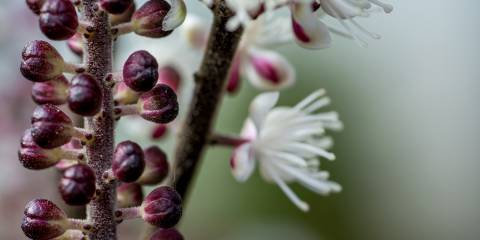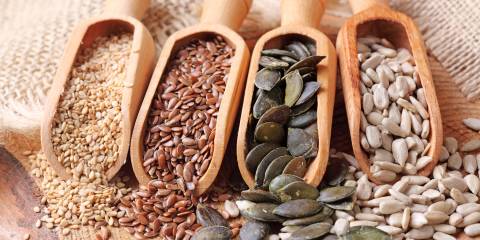Keeping hormones in balance can be a tricky business for women throughout the lifespan.
Starting at puberty and continuing until about age 40, many women experience symptoms related to excessive estrogen—namely PMS.
Hormone changes around pregnancy can also create challenges.
Then, from age 50 onward, too little estrogen can lead to discomforts associated with menopause.
Fortunately, a few key supplements can help women reach that elusive sweet spot of hormonal balance—no matter which decade they’re in.
Whether hormone changes take place during the reproductive years or as those years come to an end, there are many natural tools to bring hormones back into balance.
The PMS Rollercoaster
“Estrogen, although it is ‘friend,’ can also be ‘foe,’ in that too much at the wrong time can cause hormonal havoc,” explains Laurie Steelsmith, ND, LAc, author of Growing Younger Every Day: The Three Essential Steps for Creating Youthful Hormone Balance at Any Age (Daily Wellness Company, 2017).
In women from teens through menopause, estrogen dominance contributes to the PMS symptoms of irritability, weepiness, moodiness, bloating, breast tenderness, and fatigue.
Lowering estrogen and enhancing production of another hormone, progesterone, can reduce these symptoms.
Tips for Lowering Estrogen Levels
-
Exercise
To lower estrogen, Dr. Steelsmith recommends exercise. “Work out, sweat, and move every day to help your liver do its job of detoxifying your body, including estrogen,” she explains.
-
Nutrition
In addition, choose foods that help the liver break down estrogen; these would be cruciferous vegetables such as broccoli, cabbage, cauliflower, and Brussels sprouts.
These veggies contain compounds like indole-3-carbinol that convert unfriendly forms of estrogen into friendly forms.
-
Herbs and Supplements
“Consider boosting your liver function with beets and dandelion tea (an herb known for its ability to help your liver make bile) and it has the bonus as a slight diuretic that helps with bloating,” says Dr. Steelsmith.
She’s also a fan of vitamin B6, since it helps the liver break down estrogen, acts as a natural diuretic, and can enhance mood by activating “feel good” brain chemicals such as serotonin.
Chasteberry to Boost Progesterone
For the second half of the estrogen/progesterone equation, Dr. Steelsmith suggests boosting the body’s ability to produce progesterone with chasteberry.
This herb can alleviate PMS symptoms and restore progesterone balance.
New Moms’ Ups & Downs
New mothers are at the mercy of a hormone carnival ride after delivery, and it can take several months for the ride to stop.
This hormone imbalance can manifest as mood swings and headaches; you may see it on your skin with conditions like acne.
Suggested Nutrients
-
Fiber Intake
Increasing fiber intake helps restore hormonal balance because fiber enhances estrogen excretion.
Most women don’t even get half of the 25 grams of fiber they should eat every day.
Increase your fiber intake over a couple of weeks since a sudden surge in fiber intake could leave you bloated and gassy.
-
Liver Health
Keeping your liver in tiptop shape—since your liver is where hormones are processed—can get you off the hormone rollercoaster more quickly.
Milk thistle is the go-to herb for a well-running liver. It contains a compound called silymarin that is considered responsible for the herb’s detoxifying power.
Menopause: Another Wild Ride
Menopause does bring an end to those troublesome PMS symptoms. However, new hormone imbalance issues can crop up during the natural process of menopause
- hot flashes
- headaches
- muscle aches
- weight gain
- mood swings
- vaginal dryness
- insomnia
- hair loss
Tips to Reduce Hot Flashes
Hot flashes create a lot of unpleasantness for many women around the time of menopause.
-
Maca
Maca, an herb from Peru, offers hope for hot flash sufferers.
Maca’s long history of traditional use in the Andes region has linked this herb to female hormone balance for centuries.
-
Pycnogenol
Pycnogenol, an antioxidant-rich extract from the bark of French maritime pine trees, may also help with peri- menopausal symptoms.
A study of 170 women taking 30 milligrams (mg) twice a day found that after three months of use, the women taking this supplement—compared to those taking placebos—experienced significantly fewer hot flashes and better sleep.
In other research on postmenopausal women receiving 100 mg of Pycnogenol daily, the women reported reduced hot flashes, improved sleep, reduced irritability, and less vaginal dryness.
-
Omega-3 / DHA
Perimenopausal women who get plenty of the omega-3 fatty acid DHA appear to be at a lower risk of hot flashes, or if they do get them they aren’t as severe.
These benefits are seen with omega 3s when the supplement is used for four months or longer.





